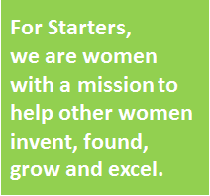 Michael Piazza Photography
Michael Piazza Photography We’re right to be alarmed by the stunning amount of fem-fueled entrepreneurial potential being left on the table. At Babson College Center for Women’s Entrepreneurial Leadership, we believe the opportunities ahead far outweigh the challenges. There are three critical lessons we’ve learned from our experience working with entrepreneurs that can create greater gender balance and by extension, extraordinary economic and social impact.
http://blogs.wsj.com/accelerators/2014/08/19/susan-duffy-3-lessons-learned-in-creating-gender-balanced-entrepreneurship/
A national narrative fixated on the small percentage of equity-investable tech businesses misses a big part of the positive picture of high-growth-potential, women-owned ventures. According to the U.S. Global Entrepreneurship Monitor (GEM) report in 2013, American women have the highest rate of entrepreneurial activity of all developed countries surveyed: one out of 10 women was starting or running a new business.
Women-led companies have outperformed all but the largest publicly traded companies in terms of growth rate, employment and revenues since 1997. In short, we have a country full of educated and experienced women churning out innovative high-potential companies only to be choked off from the capital required to catalyze growth. It’s time to write a new chapter in the startup story where investors, entrepreneurs and the economy benefit from a broader, more inclusive ideal of entrepreneurial success.
See what other startup mentors have to say about fixing the gender imbalance at startups.2. Redefine startup success.
Gender matters. Gender-diverse boards run better performing companies; and women-led startups are on fire. The current “one size fits all” version of what attracts both capital and cultural attention is robbing our economy of entrepreneurial potential as well as the requisite role models for a new generation of entrepreneurs.
Startups need a makeover and a good place to start is by recognizing the hazard of “homophily”: the human tendency to value the familiar. In this case, it’s the familiar sector, venture type and founder profile. The current practice of privileging the status quo with access to funding, networks and resources is actually anti-entrepreneurial. Sure, if he looks like me and sounds like me he might be worth a shot, but so might she. Women entrepreneurs frequently lament that otherwise savvy investors just didn’t “get” their businesses. Actively seeking diversity on investor teams will also help.
3. Redesign One Startup Gateway: Accelerators
Venture accelerators are now a common path to startup success and they too replicate the gender-imbalanced status quo. A gender split of five men to every one woman is common in accelerators, as is an unquestioned—and likely unintentional—masculine-normed culture. From pitching criteria to mentor pools, a “bro culture” is common. At Babson, we’ve taken steps to address startup gender imbalance by creating The Women Innovating Now (WIN) Lab. The lab differentiates from traditional accelerators by focusing on both the high-potential enterprise and on the woman entrepreneur. At WIN, we’ve built a community of women entrepreneur experts, women speakers, women coaches and mentors to create a new startup success story. Next-gen entrepreneurs can identify with and learn from best-in-class women entrepreneurs who share their victories and defeats.
WIN Lab fills in the early gap. While the ideation phase of building a successful business is critical to growth intentions, most programs geared toward early-stage businesses don’t want to take this burden. Our hope is that WIN is a temporary solution that will soon be replaced by a fully gender-balanced model of entrepreneurial acceleration. Until then we will continue to create an environment in which women tap their unique blend of assets, thrive in the demanding but development-oriented environment and encourage each other to soar.
Ms. Duffy is the executive director of the Center for Women’s Entrepreneurial Leadership. She serves on the board of directors of the Tory Burch Foundation and the International Council for Small Business.

 RSS Feed
RSS Feed
